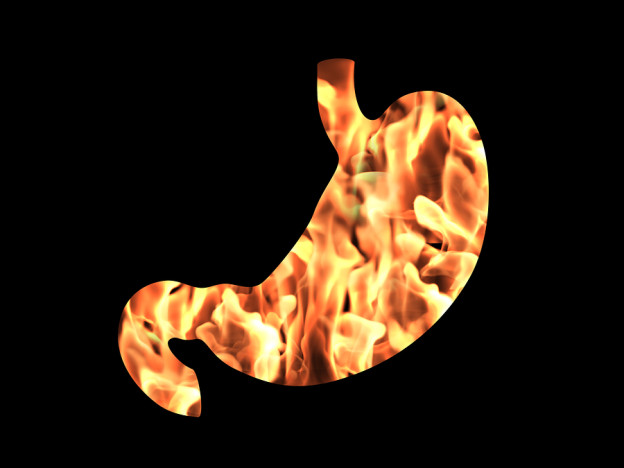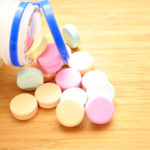By David Blyweiss, M.D., Advanced Natural Wellness
January 10, 2020
I learned a while ago that I can’t handle red tomato sauces for dinner. The acidity in foods like pizza and pastas just doesn’t agree with me anymore.
So, when indigestion or acid reflux strikes, I find immediate relief with two Alka-Seltzer tablets.
‘Plop, plop, fizz, fizz’… the bicarbonate in these little tablets has provided relief for hundreds of years. It’s actually healthy!
They work immediately and there’s no issue of having more of an alkaline base in my blood. Now, this works for me because I specifically know the tomato sauce is causing my discomfort.
But if you suffer frequently from general indigestion or acid reflux, you may be tempted to reach for an antacid pill.
After all, what harm could it do?
Well, some antacids might be doing more damage than you would expect.
Open your arteries, improve blood flow for a new health miracle...
Did you know your circulatory system has over 60,000 miles of arteries, veins and other blood vessels, if stretched end to end?
But as you age, your blood vessels undergo changes, which may cause them to stiffen, thicken and get clogged.
GOOD NEWS! Doctors have now identified a “Miracle Molecule” inside your arteries that helps OPEN your arteries and IMPROVE blood flow.
It’s what Dr. Valentin Fuster calls it, "One of the most important discoveries in the history of cardiovascular medicine."To you, that means...
- Healthy blood pressure
- Sharper mind and memory
- Skyrocketing energy and muscular strength
- Increased pleasure and passion in the bedroom
- Improved circulation to every cell and organ in your body
Go here to discover a new natural way to significantly boost the levels of this miracle molecule in YOUR body NOW!
They’re called protein pump inhibitors, or PPIs. Some of the brands that fall into this category include Nexium, Prilosec and Prevacid.
Now, the whole purpose of these drugs is to reduce the production of hydrochloric acid (HCL) in your stomach.
Well, that’s a real problem, because at least half of patients with heartburn—especially those over age 60—don’t have enough stomach acid to start with!
Once we hit the age of 55, 60, or 65, the cells in our stomach are not able to make HCL as well as they used to. The bile salts from our liver sometimes back up.
And, when you have too little HCL, you end up with the same problems that occur when you have too much: heartburn, acid reflux, sour stomach and so on.
People think they have too much acid, when they actually have too little.
This means you might be treating the wrong problem altogether. And it could be making matters much worse.
Even more troubling, this class of drugs comes with a host of dangers that their manufacturers would much rather you didn’t know about.
The World's Quickest Solution for Ending Prostate and Urinary Misery
This has recently been revealed to be one of the only real breakthroughs in prostate health.
The seeds of a strange fruit (sometimes called "Chinese Apples") hold powerful phytonutrients that are a revolution in prostate health.
In fact, UCLA and Veterans Administration research have now proved this to be true.
Not only that, but it may be the worlds quickest solution for ending prostate misery.
Simply stated, these phytonutrients represent a huge step beyond beta sitosterol, saw palmetto, and other phytosterols alone.
Simply click HERE if you want to have fast prostate relief...restful, uninterrupted sleep...no more constant "urges to go"...enhanced virility...and optimal prostate support for life.
PPIs can double your risk of developing chronic kidney disease. They increase your chance of a heart attack by about 20%… and deplete both your vitamin B12 and magnesium stores.
Plus, PPIs can weaken your bones which increases your risk of a hip or spinal fracture. They also strip away beneficial bacteria in your gut, leaving you open to antibiotic resistant infections like clostridium difficile — a “super-bug” that causes diarrhea and colon inflammation.
Needless to say, these risks aren’t minor. And if the PPI antacids aren’t even treating the right problem to start with, it just adds insult to injury.
So here’s what I suggest.
You can find out if low HCL is the source of your problem by taking a tablespoon of apple cider vinegar the next time heartburn strikes. If the pain disappears, that’s a pretty good indication your body isn’t producing enough hydrochloric acid.
There are also tests any GI specialist can do that can tell if you have low levels of HCL.
In this case, restoring your body’s natural production of stomach acid is at the top of your list. And it’s easy enough to do. Just take 650 mg of HCL betaine with pepsin at the beginning of each meal.
Once your natural levels are restored, you’ll start to feel a little burning after taking a dose. This is your signal to lower the dose until you can discontinue it altogether.
It’s also important to replenish your natural digestive enzymes.
The best way to do this is by eating more raw fruits and vegetables. Papaya, pineapple, kiwi, parsley, kale, broccoli, apples, pears, strawberries and sprouted grains are all great sources.
Or, you can restore a natural acid and enzyme balance by supplementing with digestive enzymes. Choose a formula that contains a good mix of enzymes, including:
- Amylase for carbohydrate digestion
- Protease to help digest proteins
- Lipase for the digestion of fats
- Maltase to convert complex sugars in grain foods to glucose
- Cellulase to break down fibers
- Sucrase to help digest sugars
Last, but not least, you’ll want to repair any damage caused by GERD and acid-blocking drugs.
For that, try deglycyrrhizinated licorice (DGL). It can help ease your heartburn symptoms while repairing the mucosal lining of the stomach. Simply chew two DGL tablets before eating or whenever heartburn strikes.
SOURCES:
Lazarus B, et al. Proton pump inhibitor use is associated with incident chronic kidney disease. Presented at: ASN Kidney Week 2015, 3–8 November, San Diego, California
Shah NH, et al. Proton Pump Inhibitor Usage and the Risk of Myocardial Infarction in the General Population. PLoS One. 2015 Jun 10;10(6):e0124653.
Yu EW, Bauer SR, Bain PA, Bauer DC. Proton pump inhibitors and risk of fractures: a meta-analysis of 11 international studies. Am J Med. 2011 Jun;124(6):519-26.
Jackson MA, et, al. Proton pump inhibitors alter the composition of the gut microbiota. Gut. Published online first Dec 2015.
Choudhry MN, et al. Overuse and inappropriate prescribing of proton pump inhibitors in patients with Clostridium difficile-associated disease. QJM. 2008 Jun;101(6):445-8.
Yago MR, et al. “Gastric Re-acidification with Betaine HCl in Healthy Volunteers with Rabeprazole-Induced Hypochlorhydria.” Mol Pharm. Nov 4, 2013; 10(11): 4032–4037.
Khayyal MT. Antiulcerogenic effect of some gastrointestinally acting plant extracts and their combination. Arzneimittelforschung. 2001;51:545-553.







